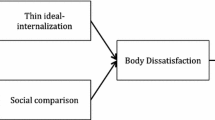Abstract
The eating disorder examination questionnaire (EDE-Q) Global score is a self-report measure of global eating disorder (ED) psychopathology. This study used ecological momentary assessment (EMA) to evaluate the ecological validity of EDE-Q Global scores among obese adults. Fifty obese adults completed the EDE-Q and 2 weeks of EMA ratings prior to initiating eating episodes and subsequently after eating episodes. EMA items assessed behavioral symptoms [i.e., loss of control (LOC) eating and overeating] and cognitive symptoms (i.e., weight/shape concerns, eating concerns, and restraint). EDE-Q Global was associated with increased EMA weight/shape concerns and fear of LOC at pre-eating recordings. EDE-Q Global was associated with increased EMA post-episode weight/shape concerns, eating concerns, LOC eating, and overeating. There was no association between EDE-Q Global and EMA restraint. Results generally supported the ecological validity of EDE-Q Global scores. Future studies of ED psychopathology in obese adults may benefit from considering EDE-Q Restraint separately.
Level of Evidence Level V, descriptive study.
Similar content being viewed by others
References
Hilbert A, De Zwaan M, Braehler E (2012) How frequent are eating disturbances in the population? Norms of the eating disorder examination-questionnaire. PLoS ONE 7:e29125. doi:10.1371/journal.pone.0029125
Darby A, Hay P, Mond J, Rodgers B, Owen C (2007) Disordered eating behaviours and cognitions in young women with obesity: relationship with psychological status. Int J Obes 31:876–882. doi:10.1038/sj.ijo.0803501
Doyle AC, Goldschmidt A, Huang C, Winzelberg AJ, Taylor CB, Wilfley DE (2008) Reduction of overweight and eating disorder symptoms via the Internet in adolescents: a randomized controlled trial. J Adolesc Health 43:172–179. doi:10.1016/j.jadohealth.2008.01.011
Grilo CM, Masheb RM, Wilson GT (2005) Efficacy of cognitive behavioral therapy and fluoxetine for the treatment of binge eating disorder: a randomized double-blind placebo-controlled comparison. Biol Psychiatry 57:301–309. doi:10.1016/j.biopsych.2004.11.002
Fairburn CG, Beglin SJ (1994) Assessment of eating disorders: interview or self-report questionnaire? Int J Eat Disord 16:363–370. doi:10.1002/1098108X(199412)16:4%3c363:AID-EAT2260160405%3e3.0.CO;2-#
Berg KC, Peterson CB, Frazier P, Crow SJ (2012) Psychometric evaluation of the eating disorder examination and eating disorder examination-questionnaire: a systematic review of the literature. Int J Eat Disord 45:428–438. doi:10.1002/eat.20931
Yoshiuchi K, Yamamoto Y, Akabayashi A (2008) Application of ecological momentary assessment in stress-related diseases. Biopsychosoc Med 2:13. doi:10.1186/1751-0759-2-13
Solhan MB, Trull TJ, Jahng S, Wood PK (2009) Clinical assessment of affective instability: comparing EMA indices, questionnaire reports, and retrospective recall. Psychol Assess 21:425–436. doi:10.1037/a0016869
Stone AA, Schwartz JE, Broderick JE, Shiffman SS (2005) Variability of momentary pain predicts recall of weekly pain: a consequence of the peak (or salience) memory heuristic. Personal Soc Psychol Bull 31:1340–1346. doi:10.1177/0146167205275615
Stone AA, Schwartz JE, Neale JM, Shiffman S, Marco CA, Hickcox M, Paty J, Porter LS, Cruise LJ (1998) A comparison of coping assessed by ecological momentary assessment and retrospective recall. J Personal Soc Psychol 74:1670–1680. doi:10.1037/0022-3514.74.6.1670
Jacobi C, Völker U, Trockel MT, Taylor CB (2012) Effects of an Internet-based intervention for subthreshold eating disorders: a randomized controlled trial. Behav Res Ther 50:93–99. doi:10.1016/j.brat.2011.09.013
Marzola E, Knatz S, Murray SB, Rockwell R, Boutelle K, Eisler I, Kaye WH (2015) Short-term intensive family therapy for adolescent eating disorders: 30-month outcome. Eur Eat Disord Rev 23:210–218. doi:10.1002/erv.2353
Zabinski MF, Pung MA, Wilfley DE, Eppstein DL, Winzelberg AJ, Celio A, Taylor CB (2001) Reducing risk factors for eating disorders: targeting at-risk women with a computerized psychoeducational program. Int J Eat Disord 29:401–408. doi:10.1002/eat.1036
Berg KC, Crosby RD, Cao L, Crow SJ, Engel SG, Wonderlich SA, Peterson CB (2015) Negative affect prior to and following overeating-only, loss of control eating-only, and binge eating episodes in obese adults. Int J Eat Disord 48:641–653. doi:10.1002/eat.22401
Goldschmidt AB, Crosby RD, Cao L, Engel SG, Durkin N, Beach HM et al (2014) Ecological momentary assessment of eating episodes in obese adults. Psychosomat Med 76:747–752. doi:10.1097/PSY.0000000000000108
Wonderlich JA, Lavender JM, Wonderlich SA, Peterson CB, Crow SJ, Engel SG et al (2015) Examining convergence of retrospective and ecological momentary assessment measures of negative affect and eating disorder behaviors. Int J Eat Disord 48:305–311. doi:10.1002/eat.22352
Hu LT, Bentler PM (1999) Cutoff criteria for fit indexes in covariance structure analysis: conventional criteria versus new alternatives. Struct Equ Model 6:1–55
Schwartz JE, Stone AA (1998) Strategies for analyzing ecological momentary assessment data. Health Psychol 17:6–16. doi:10.1080/10705519909540118
Grilo CM, Reas DL, Hopwood CJ, Crosby RD (2015) Factor structure and construct validity of the eating disorder examination-questionnaire in college students: further support for a modified brief version. Int J Eat Disord 48:284–289. doi:10.1002/eat.22358
Acknowledgements
This work was supported by Grants P30DK50456 from the National Institute of Diabetes and Digestive and Kidney Diseases, and T32MH082761 from the National Institute of Mental Health.
Author information
Authors and Affiliations
Corresponding author
Ethics declarations
Conflict of interest
The authors have no conflicts of interest to report.
Ethical approval
All procedures performed in studies involving human participants were in accordance with the ethical standards of the institutional and/or national research committee and with the 1964 Helsinki Declaration and its later amendments or comparable ethical standards.
Informed consent
Informed consent was obtained from all individual participants included in the study.
Rights and permissions
About this article
Cite this article
Mason, T.B., Smith, K.E., Crosby, R.D. et al. Does the eating disorder examination questionnaire global subscale adequately predict eating disorder psychopathology in the daily life of obese adults?. Eat Weight Disord 23, 521–526 (2018). https://doi.org/10.1007/s40519-017-0410-0
Received:
Accepted:
Published:
Issue Date:
DOI: https://doi.org/10.1007/s40519-017-0410-0




